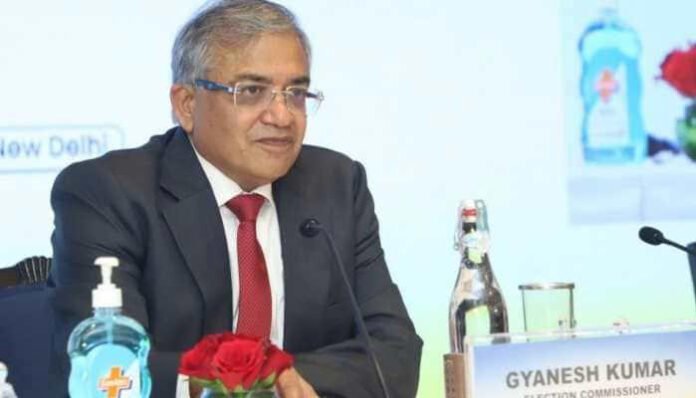Gyanesh Kumar, a seasoned Indian Administrative Service (IAS) officer, has recently been appointed as India’s new Chief Election Commissioner (CEC). His elevation to this pivotal constitutional role marks a continuation of his distinguished career in public service and governance. Kumar is widely recognized for his strategic role in implementing some of the most significant political reforms in India, including the abrogation of Article 370 in Jammu and Kashmir. His journey from a dedicated bureaucrat to the nation’s top election official underscores his administrative acumen and commitment to upholding democratic processes.
Early Life and Career
Gyanesh Kumar belongs to the 1988 batch of the IAS, hailing from the Kerala cadre. Over the years, he has carved a niche for himself as a reliable and efficient administrator. Kumar’s bureaucratic journey is marked by his extensive experience across various departments, including those dealing with internal security, governance reforms, and election management.
Key Contributions
One of the most defining moments in Kumar’s career was his instrumental role in the abrogation of Article 370 in 2019. This constitutional provision granted special status to the erstwhile state of Jammu and Kashmir. Kumar, serving in the Ministry of Home Affairs as Additional Secretary, played a critical part in executing this historic move. He worked closely with the central government to ensure the smooth transition of Jammu and Kashmir into two Union Territories—Jammu & Kashmir and Ladakh.
Kumar’s expertise in internal security and governance made him a trusted hand during the sensitive and complex process. His meticulous planning and execution facilitated the legal and administrative groundwork that led to the revocation of Article 370, a move that redefined India’s political landscape.
Path to the Chief Election Commissioner
Prior to his appointment as CEC, Gyanesh Kumar served in various high-profile roles, including Secretary in the Ministry of Parliamentary Affairs and the Ministry of Cooperation. His work in these capacities highlighted his capability to navigate complex legislative and cooperative frameworks. His experiences in these roles further refined his understanding of India’s electoral and democratic machinery.
The Election Commission of India (ECI) is entrusted with conducting free and fair elections in the world’s largest democracy. Kumar’s appointment as CEC comes at a crucial time, as the nation gears up for the 2024 General Elections. His administrative background and crisis-handling capabilities make him a fitting choice to oversee this mammoth democratic exercise.
Challenges Ahead
As he assumes the mantle of CEC, Gyanesh Kumar faces several challenges. Ensuring the integrity and transparency of elections, curbing electoral malpractices, and promoting voter participation are some of the primary concerns. The increasing influence of money and muscle power in elections, coupled with the rise of misinformation campaigns, adds to the complexities of his role.
Moreover, the Election Commission’s impartiality has often been questioned in recent years. Restoring public faith in the institution and ensuring that elections remain a fair contest will be pivotal to Kumar’s tenure. His track record suggests that he possesses the administrative fortitude and impartiality required to navigate these challenges.
Vision for the Future
Gyanesh Kumar’s vision as CEC is expected to align with his legacy of precision and reform-oriented governance. Strengthening voter awareness, integrating technology to enhance electoral processes, and ensuring stricter enforcement of election laws are likely to be high on his agenda.
His emphasis on internal security and his proven ability to handle high-pressure assignments suggest that Kumar will bring a resolute and reformist approach to election management. He is expected to champion efforts aimed at curbing electoral malpractices while ensuring that every citizen can exercise their democratic right without fear or coercion.
Gyanesh Kumar’s appointment as India’s Chief Election Commissioner is a testament to his exemplary service in the Indian bureaucracy. His instrumental role in the abrogation of Article 370 demonstrated his ability to navigate politically sensitive and legally complex issues. As he steps into his new role, Kumar carries the responsibility of safeguarding the integrity of India’s democratic process. With his extensive experience and proven administrative capabilities, he is poised to steer the Election Commission toward greater transparency, efficiency, and public trust.

